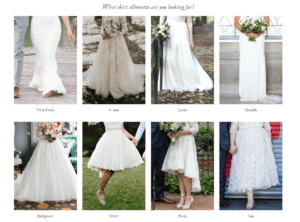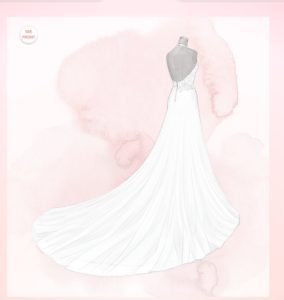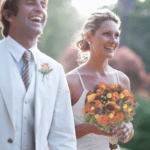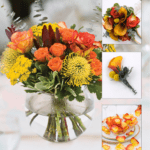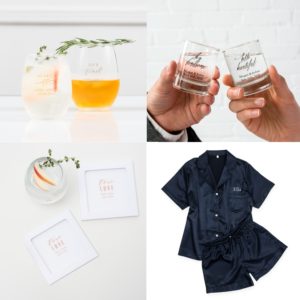White gowns, exquisite bouquets, diamond rings—these are some of the things that make up the traditional Western wedding. However, these items are only part of the nearly $30,000 the average U.S. couple spends on a wedding ceremony and reception, according to WeddingWire, a wedding planning website under The Knot Worldwide..
That $30,000 for an average wedding doesn’t capture costs outside the main financier’s responsibility, though. These include things like wedding guest attire, wedding gifts and transportation for attendees.
Amanda Goetz, vice president of marketing for The Knot, says that it’s difficult to determine how much a wedding guest might spend in an entire year. However, a wedding guest spends an average of $120 for a wedding gift, $400 on travel and accommodations and—for those that want to purchase a new outfit—roughly $155 on new attire and accessories.
Altogether (including the average $30,000), this makes the wedding market a $78 billion industry, according to estimates by market research company IBISWorld.
The wedding industry has traditionally followed a mostly bricks-and-mortar model. While more online retailers can sell wedding-related items in the decor category, it is sometimes harder to break into other markets, such as wedding dresses, fresh flowers and jewelry. Many brides want to touch, feel and try on their wedding gowns. Flowers can wilt when shipped. And purchasing a $15,000 engagement ring online to be shipped gives some people pause.
“Shifting consumer buying habits in a very traditional industry such as bridal does not happen overnight,” says Ranu Coleman, chief marketing officer of Azazie, an online bridal and bridesmaid gown and accessories retailer.
“Although digital resources [such as wedding websites, apps and social media] have become the go-to for wedding inspiration, the majority of to-be-weds continue to rely on local bricks-and-mortar stores for big-ticketed purchases related to their wedding, like engagement rings (40% of couples purchase engagement rings from a local store) and wedding day attire,” says Goetz. “For those who opt to shop online, they may do so because of the convenience factor or to have a wider variety of options that may not be available in a store near them.”
But many online retailers have found ways to combat these obstacles. In fact, 35% of brides married in 2018 looked at wedding dresses and other wedding attire online, according to Wedding Wire.
Retailers like Azazie, online custom wedding gown retailer Anomalie, jewelry retailer With Clarity, and floral retailer Calyx Flowers are working to reach these brides and grooms online.
How brides are shopping for wedding dresses online
When it comes to online bridal attire, Azazie has helped brides and bridesmaids select their gowns since 2014. But working against the traditional industry hasn’t been without its obstacles.
“The first hurdle was convincing customers to shop online for a major purchase like a bridal gown,” Coleman says. The retailer established the try-at-home sample program to address this, she says.
Azazie (No. 1091 in the Digital Commerce Next 1000) will ship brides up to three dresses at a time for $15 per dress, which includes delivery and return shipping. A shopper can try on her dress and keep it for a week before sending it back with a pre-paid return label.
Coleman says that the try-on program has become one of the largest in the country, “with customers opting to forgo the traditional bricks-and-mortar shopping experience for more intimate ‘try-on parties’ in the comfort of their own homes.”
The personalization that each wedding requires prompted Azazie to create a virtual showroom, which allows brides and bridesmaids to share their favorite dress styles, with many of these dresses available in more than 60 colors.
“[The virtual showroom] is particularly attractive to bridal parties who live in different states as it saves everyone time and money,” Coleman says. “The showroom functions as a group chat, with more seamless functionality and a better user experience—all of which ensure the customer stays on-site and engaged in the sales funnel.”
Custom wedding gown retailer Anomalie is very familiar with bridal personalization. Co-founder Leslie Voorhees Means started the company with her husband because she was frustrated with the markups and lack of availability around fit and options when it came to wedding dresses. The online retailer intends to make wedding dress buying better for brides, with its most recent effort culminating in the form of its DressBuilder.
While Anomalie has worked with brides to design their perfect wedding dress since its inception, the introduction of its DressBuilder platform—built in-house—will help them reach more brides, Voorhees Means says. Brides answer a series of questions, ranging from what climate they will be getting married into what type of fabric interests them, as well as questions on hemlines, necklines, skirt silhouette and more.
Next, the DressBuilder shows brides an example of the dress they designed, with the option to add tweaks to certain areas. Afterward, it encourages them to set up a design consultation to confirm all dress details, pay an invoice and then have the retailer begin production.
The entire process is a collaboration between Anomalie stylists, the bride and the wedding party, Voorhees Means says.
“For a lot of brides, that community of mom, bridesmaids and best friends is important,” Voorhees Means says. “We feel that that can be a digital-first experience. We hear brides all the time talking about how they’ve been sharing our sketches and still involving mom and friends on what type of fabric or lace they want in the design. I don’t think that requires an in-store or physical experience.”
But being fully digital isn’t something a lot of Anomalie brides stick to. The experience of feeling fabric is difficult to digitize, Voorhees Means says. The retailer sends boxes to brides so they can view the exact color they’re purchasing, to feel the fabric and to ensure the mesh matches the bride’s skin tone.
“We hear often that brides will want to involve mom with this, so we’ll send two packages: one to mom and one to the bride,” Voorhees Means says.
That collaboration between everyone in the bride’s life as well as the stylists at Anomalie is essential for an online company, Voorhees Means says.
The tricky business of selling flowers online
Flowers are a central part of wedding ceremonies and the reception, usually accenting the decor and touching everything from the bridal bouquet to centerpieces. But the online floral industry faces completely different obstacles than the apparel industry when it comes to online sales. Primarily, these merchants need to be able to ship flowers without the product wilting or dying in transit.
“We are very cognizant of weather,” says Kap Wallingford, co-owner of online floral retailer Calyx Flowers. “We have heat packs in the winter, cold packs in the summer.”
On top of weather concerns, floral retailers also have to manage the hurdle of shipping a live product. Calyx Flowers overcomes this by being communicative with its customers and shipping its flowers and plants in what it calls an “arrive alive.”
“It’s a baggy of water we put on the bottom of each stem,” Wallingford says. “We ship them in longer stems and then need folks to follow the directions [we provide], trim the flowers and put them in the vases.”
Wallingford and her customer service team manages roughly three calls a week from customers, usually asking how they can get the best value out of their arrangements. Wallingford herself handles many of these calls.
“I like to be hands-on with every single customer,” Wallingford says. “That’s what makes us very different.”
That hands-on experience has come in handy with the new wedding line Calyx Flowers launched last year. The retailer offers individual bouquets or complete wedding packages, which include bridal bouquets, corsages, boutonnieres, table centerpieces and petals.
Finding the perfect engagement ring
A look at the online wedding industry wouldn’t be complete without the addition of engagement rings and wedding bands. 55 retailers in the Top 1000 and Next 1000 sell jewelry online.
The online startup With Clarity (No. 1181 in the Next 1000) has taken a new approach to online engagement ring shopping. The retailer, which launched in 2015, will 3D print a replica of a consumer’s ring—many of which are mostly customized—for the customer to try on before he spends what could be thousands of dollars.
“Researching and shopping for an engagement ring is extremely daunting,” says Anubh Shah, CEO and co-founder of With Clarity. “And I think With Clarity has tried to bridge that divide.”
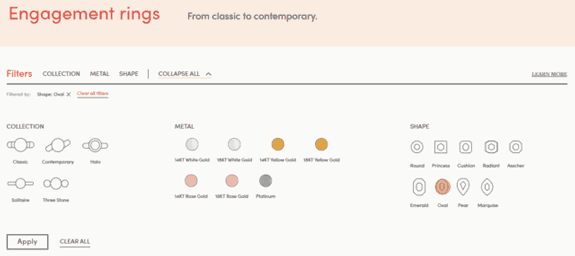
The customization settings on With Clarity’s website allows users to choose a setting—which includes the “collection,” or style of the ring, the metal used and the shape of the main diamond feature—and then select the very diamond they want.
Buyers can then opt for the “ring home preview” that sends up to two created rings to their home that they must return in three days. While not entirely customizable in that customers cannot design their own ring from scratch, 15.0% of shoppers who tried the preview option in its earlier stages eventually made a purchase compared with the 0.3% of site visitors overall, executives say.
“Now, you can choose ‘I want a rose gold finish in this ring style with an emerald-cut center, and I want it to be one-and-a-half carats,’ and that’s exactly what’s showing up on your doorstep for you to try out,” Shah says.
Favors, gifts and wedding planning
The personalization trend is still popular among soon-to-be weds, according to Goetz. The Knot Shop (owned by XO Group Inc., No. 1190 in the Next 1000), sells everything from wedding-day favors to bachelorette party accessories. The retailer helps brides and grooms find products they can customize for their wedding day, or for the other parties surrounding their engagement.
“Couples strive to add some sort of personal touch to each item from their wedding-day decor and accessories, to the gifts they give to their friends and favors handed out to guests at the end of their celebration,” Goetz says.
The top-selling products of The Knot Shop reflect this. Six of the products making their top 10 list—short shot glasses, stemless wine glasses, silky kimono robes, pajamas, matchboxes and glass coasters—are all personalized items.
But The Knot does more than just offer party-themed items and gifts for bridesmaids and wedding guests. Founded in 1996, The Knot was the first digital wedding-planning brand and continues to make strides in helping brides and grooms budget and plan for their big day. Having been in the digital wedding business for more than two decades, the people behind The Knot have noticed a few changes in the wedding industry.
“In the past decade, we’ve seen an increased reliance on technology throughout a couple’s wedding-planning process,” Goetz says. “Nowadays, social media and smartphone apps are two of the most popular platforms for to-be-weds to find inspiration.”
Wrapping it all up
189 retailers and brands in the Digital Commerce 360 Top 1000 and Next 1000 either fully or partially sell products related to the wedding industry. Partial retailers were those that sold items specific to a wedding (such as bridal gowns, wedding decor, engagement rings) and labeled them as such on their website. This analysis includes only those retailers that showcased a wedding category in the navigation bar on their websites, as it is an indication those retailers aim at the wedding market.
The 25 brands that entirely or mostly sell wedding products online generated $515.1 million in 2018 or an average of $20.6 million. Comparatively, the full 189 retailers that Digital Commerce 360 has marked as bridal made $41.85 billion, or an average of $221.4 million in the same time frame.
The large difference between averages mostly comes from the partial bridal retailers being larger businesses or having higher average order values (AOV). For example, partial bridal and apparel retailer Saks Fifth Avenue (owned by Hudson’s Bay Co. No. 41) has a Digital Commerce 360-estimated web sales of $1.26 billion compared with full bridal and apparel retailer BHLDN (a brand of Urban Outfitters Inc., No. 45) only generating $146.0 million, the highest-grossing fully bridal retailer.
The AOV of partial bridal retailers is also higher than full and mostly bridal retailers because of the high price points associated with jewelry retailers—only three of 55 jewelry merchants were full or mostly bridal retailers.
Jessica Young contributed to this article.
Favorite